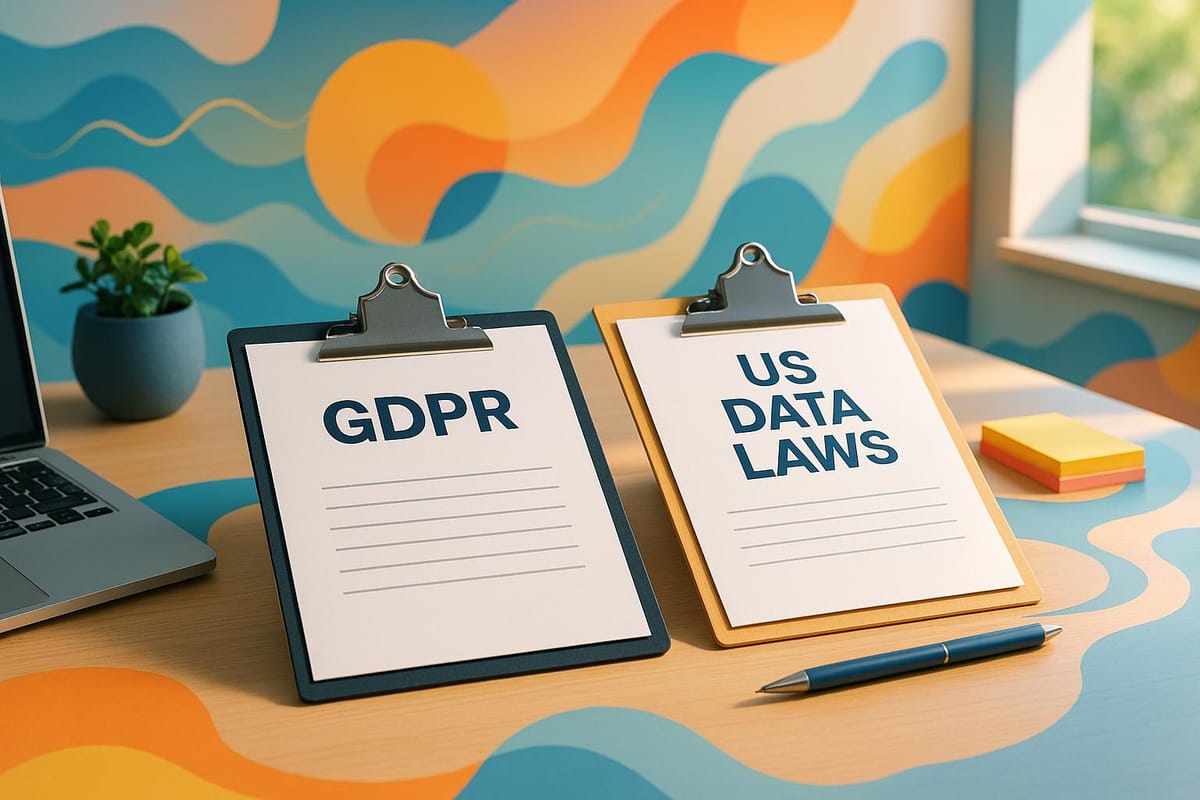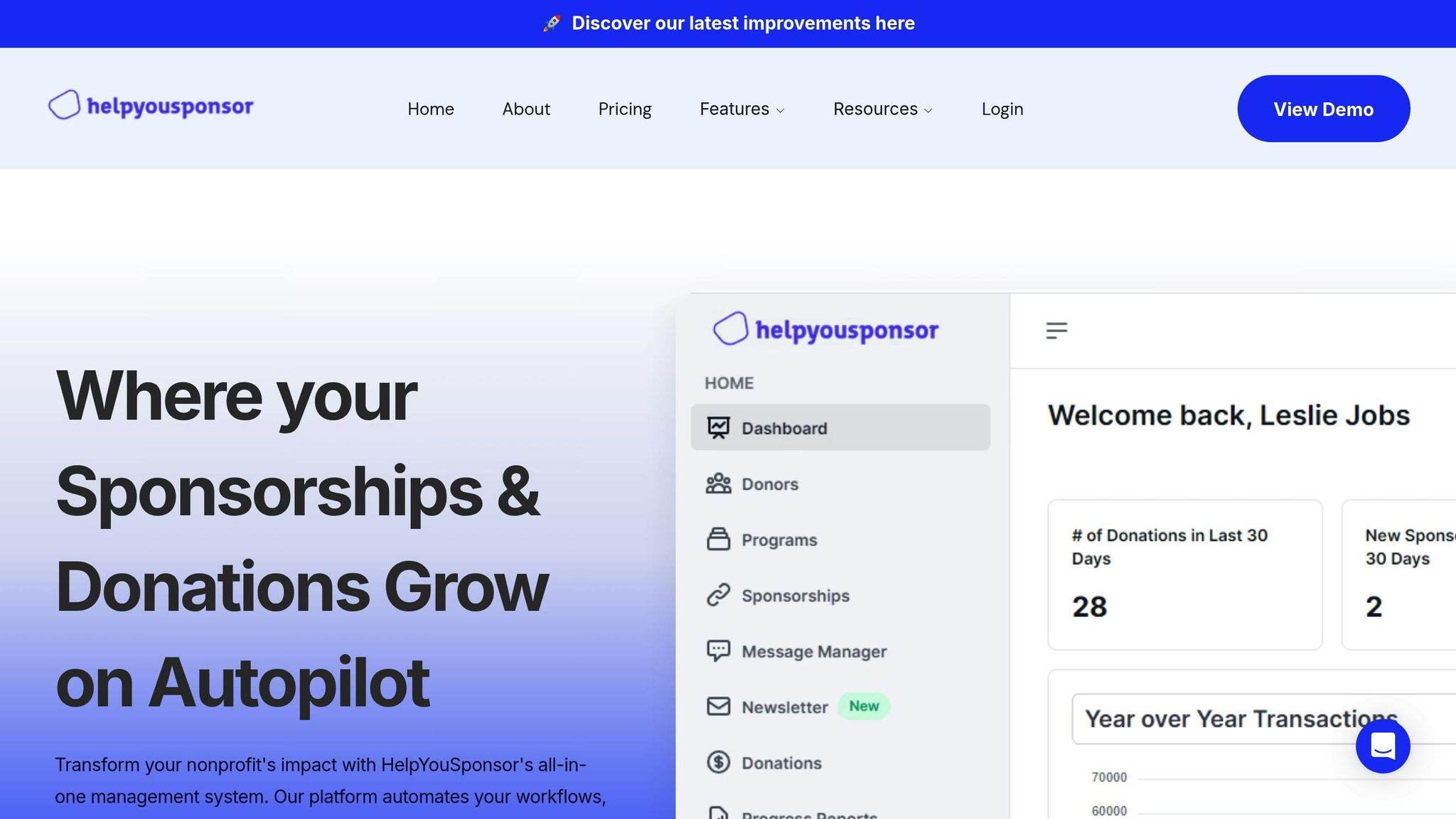GDPR vs. US Data Laws: Nonprofit Compliance Guide
Nonprofits must navigate complex data laws, including GDPR and U.S. regulations, to protect sensitive information and ensure compliance.

Nonprofits handle sensitive data daily, from donor details to beneficiary information, making compliance with data laws crucial. GDPR applies globally to organizations processing EU residents' data, requiring explicit consent and strict breach notifications. In contrast, US data laws vary by state, with exemptions for nonprofits in some cases and opt-out mechanisms for most data use. Non-compliance risks include hefty fines (up to €20 million under GDPR or $7,500 per violation in the US), loss of trust, and reputational damage. Understanding these laws ensures nonprofits protect data, maintain trust, and avoid penalties.
Key Points:
- GDPR: Global scope, no nonprofit exemptions, strict consent and breach rules.
- US Laws: State-specific, some nonprofit exemptions, opt-out focus.
- Penalties: GDPR (€20M/4% revenue), US ($2,500–$7,500 per violation).
- Best Practices: Adopt strong data protection policies, train staff, and use secure systems.
Quick Comparison
| Aspect | GDPR | US State Laws |
|---|---|---|
| Scope | Global (EU residents' data) | State-specific (based on activities) |
| Nonprofit Exemptions | None | Varies by state |
| Consent | Explicit required | Opt-out; opt-in for sensitive data |
| Breach Notification | 72 hours to authorities | 30–60 days (varies by state) |
| Penalties | €20M or 4% of annual revenue | $2,500–$7,500 per violation |
Nonprofits must assess their operations to comply with these laws, ensuring data security and trust.
Practical Steps to GDPR Compliance Success 2024
When GDPR and US Data Laws Apply to Nonprofits
Understanding what triggers compliance requirements is crucial for nonprofits navigating GDPR and US data laws. These regulations differ significantly, and nonprofits often find themselves accountable to multiple rules at the same time.
When GDPR Applies to US Nonprofits
GDPR applies to any organization that collects personal data from EU residents, regardless of where the organization is based. As Tal Frankfurt, Forbes Councils Member, explains:
"The GDPR applies to any organization that collects the data of EU residents, irrespective of whether payment is required. As soon as personal data of an EU resident is collected, it triggers the GDPR -- and the associated fines for non-compliance regardless of a company's location."
This means GDPR is triggered by the location of the data subject, not the organization. For US-based nonprofits, compliance is necessary if they offer goods or services to EU residents or monitor their online behavior. Common scenarios include international fundraising campaigns, educational initiatives, volunteer coordination, or providing services to beneficiaries in the EU.
To meet GDPR requirements, US nonprofits should prioritize organization-wide awareness and implement proper systems for managing consent. While GDPR’s rules are globally applied, US data laws are based on state-specific criteria, which we’ll explore next.
When US Data Laws Apply to Nonprofits
Unlike GDPR, US data laws form a patchwork of federal and state regulations, each with its own rules and, in some cases, exemptions for nonprofits. As of May 2025, 13 states have enacted comprehensive data privacy laws, with more set to take effect later in the year.
Federal regulations, such as CAN-SPAM and TCPA, apply broadly to nonprofit organizations. These laws require opt-out options for email communications and prior consent for phone outreach. Notably, there are no nonprofit exemptions under these federal laws, meaning they apply to virtually all US-based nonprofits.
State-level regulations add another layer of complexity. Whether a nonprofit must comply depends on factors like operating location, the amount of data processed, and revenue. Unlike GDPR, which focuses on the residency of the data subject, US state laws are tied to business activities within state borders.
The treatment of nonprofits varies widely by state. For example, California, Connecticut, and Virginia offer broad exemptions for tax-exempt organizations, while states like Colorado and New Jersey do not provide specific exemptions. Additionally, many state laws only apply if certain revenue or data volume thresholds are met, and these thresholds differ significantly from state to state.
For nonprofits operating across multiple states or serving diverse populations, navigating these exemptions can be overwhelming. As a result, many organizations find it more practical to adopt comprehensive data protection practices rather than attempt to comply with a patchwork of state-specific rules.
GDPR vs US Data Laws Comparison Table
| Aspect | GDPR | US State Laws |
|---|---|---|
| Primary Trigger | Data processing of EU residents | Business activities within state boundaries |
| Geographic Scope | Global (based on data subject location) | State-specific (based on organization activities) |
| Nonprofit Exemptions | None | Varies by state (broad, narrow, or none) |
| Consent Requirements | Explicit consent required | Opt-out mechanisms typically sufficient |
| Data Subject Rights | Access, correction, deletion, portability | Varies by state (typically access and deletion) |
| Breach Notification | 72 hours to authorities, without undue delay to individuals | Varies by state (typically 30–60 days) |
| Maximum Penalties | Up to €20 million or 4% of annual revenue | Varies by state (typically $2,500–$7,500 per violation) |
| Applicability Threshold | Any personal data processing | Often based on revenue or number of consumers |
This comparison highlights the importance of tailoring compliance strategies to meet the specific demands of these regulations. Nonprofits must carefully evaluate their operations to ensure they meet the requirements of both GDPR and relevant US data laws.
Compliance Requirements for Nonprofits
Nonprofits face a growing challenge in meeting data protection laws, especially as regulations like the GDPR and U.S. data laws impose distinct compliance measures. While the goals of these laws align - protecting personal data - their specific requirements vary significantly.
GDPR Compliance Requirements
The GDPR outlines seven core principles for processing personal data of EU residents, forming the backbone of compliance efforts. Nonprofits must establish a lawful basis for collecting data - typically through explicit consent or legitimate interests - while limiting the data collected to only what’s necessary, avoiding the creation of extensive donor profiles.
Transparency is a cornerstone of GDPR compliance. Nonprofits are required to provide clear, easy-to-understand privacy policies that explain how donor data is used. As DoJiggy explains:
"GDPR compliance for nonprofits is about creating transparency and organizing data."
Nonprofits must also ensure donors can access, correct, or delete their data and respond promptly to such requests. Strong security measures, like encryption and access controls, are critical for safeguarding this information. In the event of a data breach, organizations must notify authorities within 72 hours and inform affected individuals if the breach poses a high risk. Additionally, maintaining detailed records of data processing, conducting regular audits, and providing GDPR training for staff and volunteers are essential steps.
While GDPR sets stringent standards, U.S. data laws take a more fragmented approach.
US Data Law Compliance Requirements
In the U.S., nonprofits navigate a patchwork of federal and state regulations. Federal laws like CAN-SPAM and TCPA apply to nonprofit communications, requiring clear opt-out options for emails and prior consent for phone outreach - without exemptions for nonprofits.
At the state level, data protection laws are rapidly evolving. By May 2025, 13 states had enacted comprehensive privacy laws, with Tennessee, Minnesota, and Maryland preparing to implement theirs on July 31, July 31, and October 1, 2025, respectively. These laws demand privacy notices that clearly explain data collection, usage, sharing, and consumer rights. Nonprofits must also provide opt-out mechanisms for data sales and, in certain cases, obtain opt-in consent for processing sensitive information.
State laws grant consumers rights to access, correct, and delete their personal data, requiring nonprofits to establish systems for handling these requests within specific timeframes. Organizations must also implement strong security measures to protect data and ensure that service provider contracts include appropriate privacy and security terms.
GDPR vs US Compliance Requirements Comparison
The table below highlights the key differences nonprofits must consider when implementing GDPR and U.S. state law requirements:
| Compliance Measure | GDPR Implementation | US State Laws Implementation |
|---|---|---|
| Consent Management | Explicit consent systems with clear documentation | Opt-out mechanisms; opt-in for sensitive data only |
| Privacy Notice Content | Detailed disclosure of all processing activities | Focus on collection, sharing, and consumer rights |
| Data Subject Request Processing | Handle access, rectification, erasure, portability, objection, and restriction | Process access, deletion, and opt-out requests |
| Security Implementation | Encryption, access controls, and privacy by design | Reasonable security measures with vendor contracts |
| Staff Training Requirements | Comprehensive GDPR training for all staff | General privacy awareness with state-specific focus |
| Record Keeping | Detailed records and impact assessments | Documentation of privacy practices and breach plans |
These varied compliance measures highlight the importance of nonprofits adopting practices that align with the highest data protection standards. By doing so, they can better navigate the complexities of these regulations and safeguard donor trust.
How to Handle Data Breaches for Nonprofits
When a data breach strikes, nonprofits must act quickly, adhering to two different regulatory frameworks - each with its own rules for timing, scope, and enforcement. Let’s break down the key steps nonprofits need to follow under these frameworks.
GDPR Data Breach Response Rules
Under GDPR, a data breach includes any unauthorized access, loss, alteration, or disclosure of personal data. One of its strictest requirements is the 72-hour notification rule, which obligates organizations to inform relevant supervisory authorities within 72 hours of discovering a breach.
There are exceptions, such as when encrypted data remains secure or if the breach poses no risk, but these are rare. Most incidents will require reporting.
GDPR uses a two-tier risk assessment system for breach notifications. First, organizations must determine whether the breach poses any risk to individuals. If it does, authorities must be notified within 72 hours. The second step evaluates whether affected individuals also need to be informed. According to GDPR:
"When the personal data breach is likely to result in a high risk to the rights and freedoms of natural persons, the controller shall communicate the personal data breach to the data subject without undue delay."
Notifications to authorities must include specific details, such as the nature of the breach, the number of affected individuals, contact information for the data protection officer, potential consequences, and steps taken to address the incident. Missing the 72-hour deadline can lead to hefty fines - up to €20 million or 4% of annual global turnover, whichever is higher.
US Data Breach Response Rules
In the US, breach notification laws vary by state. Unlike GDPR’s unified approach, each state has its own definitions, timelines, and requirements.
Notification timelines in the US are generally longer than GDPR’s 72-hour rule, but the exact deadlines differ by jurisdiction. Some states require notification for any breach involving unencrypted data, while others apply risk-based thresholds similar to GDPR. Additionally, more than 20 states include health or medical information in their breach notification criteria, broadening the scope beyond basic personal identifiers.
US laws define personal information more narrowly than GDPR. For example, breaches involving names combined with Social Security numbers, driver’s license numbers, financial account details, health records, or login credentials typically trigger notification requirements. In contrast, GDPR’s definition of personal data includes standalone email addresses.
Enforcement mechanisms also differ. In the US, state attorneys general enforce breach laws, unlike GDPR’s dedicated data protection regulators. This means nonprofits don’t maintain ongoing relationships with enforcement bodies in the US, as they might with supervisory authorities under GDPR.
Penalties under state laws, such as those outlined in the California Consumer Privacy Act, can reach $7,500 per intentional violation. While these fines are lower than GDPR’s penalties, they can still add up significantly in large-scale breaches.
Data Breach Response Checklist
Nonprofits need a well-organized incident response plan that addresses both GDPR and US requirements. This plan should assign clear roles, ensure swift investigations, and outline notification procedures.
Immediate actions include containing the breach, assessing the extent of compromised data, identifying applicable regulations based on affected individuals’ locations, and documenting every step taken.
A thorough risk assessment is crucial under both frameworks. Nonprofits must evaluate the likelihood and severity of harm to individuals, considering factors like data sensitivity, encryption status, and potential for misuse. These assessments determine whether notifications are required under GDPR or the various US state laws.
Communication strategies need to align with regulatory expectations. GDPR notifications are sent to specialized data protection authorities, often with whom organizations have ongoing relationships. In contrast, US notifications are directed to state attorneys general, where no such relationships exist.
Prevention measures are equally important. Nonprofits should regularly test their response plans through simulated breach scenarios, train staff on identifying and responding to breaches, and assign clear roles for managing global incidents. Keeping updated records of data inventories, storage locations, and jurisdictions can also help streamline breach assessments.
Navigating the dual compliance requirements of GDPR and US state laws demands quick action and careful planning. By preparing in advance, nonprofits can handle breaches effectively, safeguard donor trust, and avoid costly penalties.
Using HelpYouSponsor for Compliance

Nonprofits often grapple with complex data compliance requirements across various frameworks. HelpYouSponsor simplifies this process by embedding security and compliance tools directly into its donor management platform. This integration helps organizations meet both GDPR and U.S. data law standards without the hassle of juggling multiple systems.
HelpYouSponsor Compliance Features
HelpYouSponsor prioritizes donor data security with bank-level encryption to protect sensitive information. Role-based access controls ensure that staff permissions are limited, reducing risks of unauthorized access. The platform securely centralizes donor data, making it easier to conduct risk assessments under GDPR and U.S. state laws. Additionally, its built-in messaging system secures donor communications while maintaining a comprehensive audit trail.
To lighten administrative workloads, HelpYouSponsor includes automated tools for tracking consent, managing data retention, and generating compliance reports. These features not only streamline day-to-day operations but also provide a robust foundation for handling potential data breaches efficiently.
Managing Breach Response with HelpYouSponsor
In the event of a data breach, HelpYouSponsor’s centralized design simplifies the investigation and recovery process. Audit trails meticulously log all data access and modifications, helping organizations identify the scope and timeline of any security issues. Automated backups ensure data can be quickly restored, while also supporting forensic analysis when needed.
Secure payment gateway integrations guarantee PCI-compliant processing of financial data, adding another layer of protection. The platform’s end-to-end encryption ensures donor information remains safe, even during a system compromise. Detailed documentation, including access controls and permission logs, meets the rigorous expectations of regulators during breach investigations. This cohesive approach strengthens overall compliance efforts and bolsters organizational readiness.
Solving Resource Challenges with HelpYouSponsor
Beyond compliance and breach response, HelpYouSponsor tackles the resource constraints that many nonprofits face. With 68% of nonprofits lacking documented policies for cyberattacks, creating a robust data protection program can seem daunting. HelpYouSponsor simplifies this by weaving compliance features directly into everyday operations.
The platform offers flexible pricing, including a free plan and scalable enterprise solutions, making it accessible to organizations of all sizes. Its user-friendly interface eliminates the need for specialized training - an important feature, considering that 27% of nonprofits have already experienced cyberattacks. By combining compliance, donor management, and security tools into a single platform, HelpYouSponsor reduces complexity and lowers costs.
For nonprofits managing over 500 commitments monthly, custom enterprise solutions provide tailored compliance features that scale alongside organizational growth. This ensures that even as nonprofits expand, their compliance and data security needs are effectively met.
Nonprofit Compliance Summary
Nonprofits face a maze of data protection laws, with notable differences between GDPR and U.S. regulations shaping how donor information is handled. GDPR enforces a strict opt-in consent model and carries hefty penalties - up to 4% of an organization’s global annual turnover for non-compliance. On the other hand, U.S. data laws vary by state, often applying an opt-out approach.
The scope of GDPR is expansive, applying to any organization collecting data from EU residents. Meanwhile, state-specific laws like California's CCPA focus on businesses meeting specific criteria, such as generating $25 million or more in annual revenue or managing personal information of at least 100,000 California residents.
To navigate these regulations, nonprofits must adopt clear data protection policies, secure storage systems, and transparent practices for managing donor data. With 67% of nonprofits relying on CRMs to track donations and engage supporters, choosing the right tools is critical - especially as data privacy laws continue to evolve.
As of January 31, 2024, over 25 data privacy bills were under review across 11 U.S. states, adding to the complexity. Staying compliant means investing in strong data governance practices and providing staff with proper training to adapt to these changes.
Technology can ease the burden of compliance. For example, HelpYouSponsor offers integrated tools designed to simplify adherence to both GDPR and U.S. laws. Features like bank-level encryption, automated consent tracking, and detailed audit trails allow nonprofits to manage donor data securely and efficiently. For resource-strapped organizations, such solutions reduce both costs and operational headaches.
Since trust is foundational to nonprofit success, understanding these laws, leveraging smart technology, and prioritizing donor privacy are essential for maintaining confidence and furthering your mission.
FAQs
Do US-based nonprofits need to comply with GDPR regulations?
GDPR Compliance for US-Based Nonprofits
Nonprofits based in the United States are required to comply with the General Data Protection Regulation (GDPR) if they collect or process personal data from individuals residing in the European Union (EU). The GDPR’s reach extends to any organization - no matter where it’s located - that handles the personal data of EU residents.
To figure out if your nonprofit falls under GDPR requirements, consider whether your activities involve EU residents. This could include accepting donations, running programs, or marketing efforts directed at individuals in the EU. If these apply, your organization must adhere to GDPR guidelines. This means ensuring transparency, safeguarding donor information, and using lawful methods to process data.
Taking proactive steps like conducting regular data audits and appointing a compliance officer can also help your organization stay on track with GDPR regulations. These measures not only ensure compliance but also build trust with your international supporters.
What are the main differences in consent rules between GDPR and U.S. data laws for nonprofits?
The key difference lies in how consent is handled. Under GDPR, nonprofits must obtain clear, explicit, and informed consent before processing personal data, particularly sensitive information. This usually involves an opt-in model, where individuals actively agree to the use of their data.
On the flip side, most U.S. state data laws, such as California's CCPA, emphasize giving individuals the option to opt-out of data collection and usage rather than requiring explicit opt-in consent. That said, some states mandate affirmative consent for specific activities like targeted advertising or profiling.
For nonprofits operating internationally or handling data from EU residents, GDPR's stricter consent rules take precedence. At the same time, they must navigate the varying requirements of U.S. state laws for domestic operations.
How can nonprofits prepare for data breaches under GDPR and U.S. data protection laws?
How Nonprofits Can Prepare for Data Breaches
Nonprofits need to take deliberate steps to protect sensitive donor data and comply with regulations like GDPR and U.S. data laws. Start by reviewing all the data your organization collects and stores. Make sure it's properly secured with strong measures like encryption and access controls. It's also important to establish clear privacy policies and create a detailed breach response plan. This plan should outline immediate actions, notification procedures, and any required documentation in case of a breach.
For GDPR compliance, nonprofits must notify the appropriate authorities within 72 hours of discovering a breach. Similarly, many U.S. state laws require swift notification to individuals who are affected. To ensure your team is ready, train staff on response protocols and compliance requirements so everyone understands their role if an incident occurs. Regular cybersecurity audits and ongoing education are also key to reducing risks and keeping your organization ready to handle potential threats.

